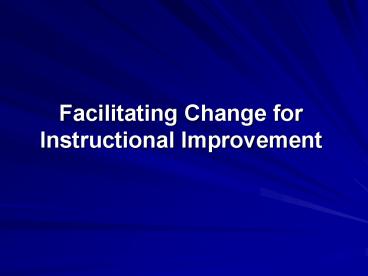Facilitating Change for Instructional Improvement - PowerPoint PPT Presentation
1 / 16
Title:
Facilitating Change for Instructional Improvement
Description:
Clinical Supervision. Preconference with teacher. Observation of classroom ... Five Tasks of Supervision that Impact Instructional Improvement. Prerequisites. Function ... – PowerPoint PPT presentation
Number of Views:162
Avg rating:3.0/5.0
Title: Facilitating Change for Instructional Improvement
1
Facilitating Change for Instructional Improvement
2
7 Correlates of Effective Schools
- Instructional Leadership
- Clear and Focused Mission
- Safe and Orderly Environment
- Climate of High Expectations
- Frequent Monitoring of Student Progress
- Positive Home-School Relations
- Opportunity to Learn and Student Time on
- Task
Lezotte McKee, 2002, p. 20
3
Examine Possible Reasons for Not Meeting
Objectives
Teacher
Learner
Curriculum
Classroom
Analyzing Student Achievement Data
Lezotte McKee, 2002, p. 155
4
Teacher
- Teaching strategies
- High/low expectations
- Understanding of learning objectives
- Philosophical agreement
- Teaching experience
- Enthusiasm for teaching
- Classroom management skills
Lezotte McKee, 2002, p. 155
5
Effective Instructional Leaders
- Promote dialogue that encourages
- teachers to reflect on their learning and
- practice.
- Promote professional growth
6
Promote Reflection
- Make suggestions
- Give feedback
- Model
- Use inquiry and solicit advice/opinions
- Praise
-
Blasé, J J, 2001, p. 23
7
Focus Where do we want to be?
Collaboration How will we get there?
Reflection Where are we now? What are we learning?
Conzemius ONeill, 2002, pp. 8 - 10
8
Promote Professional Growth
- Emphasize the study of teaching and
- learning
- Support collaboration among educators
- Develop coaching relationships
- Encourage and support program redesign
- Apply principles of adult learning
- Implement action research to inform
- instructional decision making
-
- Blasé, J J, 2001, pp. 23-24
9
Four Norms of Collegiality and Continuous
Improvement
- Teachers engage in frequent, continuous, and
increasingly concrete and precise talk about
teaching practice. - Teachers are frequently observed and provided
with useful critiques of their teaching - Teachers plan, design, research, evaluate, and
prepare teaching materials together. - Teachers teach each other the practice of
teaching.
Little, 1982, p. 331
10
Impact of Training Components
11
Principles of Adult Learning
- Adults prefer learning situations which
- Are practical and problem-centered
- Promote their positive self-esteem
- Integrate new ideas with existing knowledge
- Show respect for the individual learner
- Capitalize on their experiences
- Allow choice and self-direction
Based on work of John Goodlad
12
Clinical Supervision
- Preconference with teacher
- Observation of classroom
- Analyzing and interpreting observation and
determining conference approach - Postconference with teacher
- Critique of previous four steps
Glickman et al., 2001, p. 316
13
Five Tasks of Supervision that Impact
Instructional Improvement
Prerequisites
Function
Tasks
Unification
Product
Direct Assistance
Knowledge
Group Development
Organizational Goals
Supervision As Developmental
Student Achievement
Interpersonal Skills
Professional Development
Teacher Needs
Curriculum Development
Technical Skills
Action Research
Glickman et al., 2001, p. 443
14
Action Research Plan for Instructional
Improvement
Glickman et al., 2001, p. 425
15
Collegial School Leader
- Talk about instruction with teachers frequently
- Support collaborative efforts by supporting the
development of coaching skills and reflective
conversations - Enhance these by inspiring group purpose and
providing rewards such as praise
Blasé, J. J., 2001, p. 24
16
Guiding Question
- How can the principal, as an instructional
leader, facilitate results-driven interventions
to have the most direct and immediate impact on
student learning and student performance?































